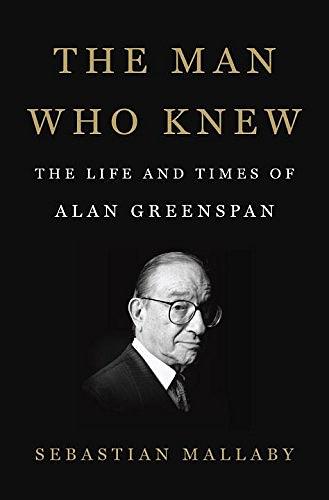Sebastian Mallaby's magisterial biography of Alan Greenspan, the product of over five years of research based on untrammeled access to his subject and his closest professional and personal intimates, brings into vivid focus the mysterious point where the government and the economy meet. To understand Greenspan's story is to see the economic and political landscape of the last 30 years--and the presidency from Reagan to George W. Bush--in a whole new light. As the most influential economic statesman of his age, Greenspan spent a lifetime grappling with a momentous shift: the transformation of finance from the fixed and regulated system of the post-war era to the free-for-all of the past quarter century. The story of Greenspan is also the story of the making of modern finance, for good and for ill.
Greenspan's life is a quintessential American success story: raised by a single mother in the Jewish émigré community of Washington Heights, he was a math prodigy who found a niche as a stats-crunching consultant. A master at explaining the economic weather to captains of industry, he translated that skill into advising Richard Nixon in his 1968 campaign. This led to a perch on the White House Council of Economic Advisers, and then to a dazzling array of business and government roles, from which the path to the Fed was relatively clear. A fire-breathing libertarian and disciple of Ayn Rand in his youth who once called the Fed's creation a historic mistake, Mallaby shows how Greenspan reinvented himself as a pragmatist once in power. In his analysis, and in his core mission of keeping inflation in check, he was a maestro indeed, and hailed as such. At his retirement in 2006, he was lauded as the age's necessary man, the veritable God in the machine, the global economy's avatar. His memoirs sold for record sums to publishers around the world.
But then came 2008. Mallaby's story lands with both feet on the great crash which did so much to damage Alan Greenspan's reputation. Mallaby argues that the conventional wisdom is off base: Greenspan wasn't a naïve ideologue who believed greater regulation was unnecessary. He had pressed for greater regulation of some key areas of finance over the years, and had gotten nowhere. To argue that he didn't know the risks in irrational markets is to miss the point. He knew more than almost anyone; the question is why he didn't act, and whether anyone else could or would have. A close reading of Greenspan's life provides fascinating answers to these questions, answers whose lessons we would do well to heed. Because perhaps Mallaby's greatest lesson is that economic statesmanship, like political statesmanship, is the art of the possible. The Man Who Knew is a searching reckoning with what exactly comprised the art, and the possible, in the career of Alan Greenspan.
1、追日是作者栎年创作的原创作品,下载链接均为网友上传的的网盘链接!
2、相识电子书提供优质免费的txt、pdf等下载链接,所有电子书均为完整版!
-
一个漫游癖的评论One of the most interesting and inspiring books I've ever read... It is not just about Alan Greenspan; it is about the history of modern monetary policy, about US politics and economy, and about the human nature. History may not repeat, but it is always retold.
-
上厕所的评论Greenspan is the man who knew, but he is not the man who knew everything. 最近看纽约客对昂山素季的报道也是这个感觉,最好不要把自己的理想主义投射到政治人物身上,一失望又大惊小怪,墙倒众人推。
-
哟是你的评论boring
-
[已注销]的评论“He embodied the idea that he had frequently denounced: that the discretionary judgments of a money-printing central bank could stabilize an economy”
-
[已注销]的评论好书。以一个人的成长、成熟、成败,理解一个时代。当这个人足够重要,他/她的个人特色也影响时代的走向及幅度。
-
馋嘴的评论喜欢作者(1)对金融知识的了解并以普通人能理解的人话解释清楚;(2)对金融界和金融历史的演变简单清晰;(3)客观评价格老,赶脚态度还是比较中立滴;折磨厚的英文书,文笔好,读起来(我是听书滴)一点也不难受,很舒服。作者功力腻害。The Man Who Knew turns out NOT fully knew. 格老做的已经不错了。
-
llawliet的评论2017 First book
-
黄大力的评论这是关于格老的传记,细数了他成长过程的重要经历,包括他的那些女朋友们,以及期间美国经济和货币政策的波澜起伏。从中可以看到格老成为最盛名卓著的央行行长绝非偶然,除了他对货币金融学的深刻理解,他与政界人物以及媒体的良好的关系,都是其他美联储主席所不具备的。当然,人非完人,在他最辉煌的时候,在美国房地产成为经济引擎,股市节节走高的时候,他也忽视了潜在的风险。
